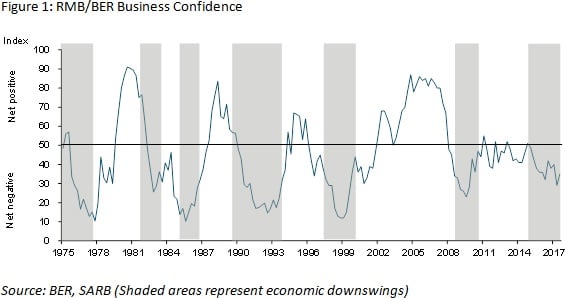A successful challenge by employers to the extension of a wage agreement in the engineering industry to non-parties is one of three such challenges being mounted this year.
Business confidence has made a marginal recovery, having dropped 11 points in the second quarter from 40 to 29, it is up six points to 35 for the third quarter of the year.
According to the RMB/BER Business Confidence Index released on Wednesday, confidence levels are still low at 35. More than 1 600 senior executives in the building, manufacturing, retail, wholesale and motor trade sectors were surveyed. The survey outcomes show almost seven out of 10 respondents remain unsatisfied with business conditions.
The low levels of confidence indicate that the economy is not likely to experience a resurgence. “In fact, the more likely scenario is one where GDP growth remains stuck at around 1% over the short to medium term, hamstrung by lacklustre private sector fixed investment and jobs growth,” the report read.
During the period, no “unsettling political events” occurred, and business activity generally did not deteriorate, the report read. For this reason the recovery in confidence levels are not surprising.
Neither of the sectors reported confidence levels above the 50-mark, indicating pessimism remains widespread.
Key findings show that sentiment improved in the manufacturing sector and motor trade, helped by increased production volumes and a rebound in confidence levels from 16 to 27. New vehicle dealers’ confidence also picked up from 11 to 19, and sales volumes improved.

Confidence levels in the retail and wholesale sector remained relatively unchanged. For retailers, confidence levels shifted from 35 to 38, compared to 45 reported in the first quarter of the year.
The wholesale sector’s confidence levels declined by one index point to 48, compared to the 56 reported at the beginning of the year.
Confidence in the building sector rose from 36 to 44, back at levels recorded in the past 18 months. Confidence in the construction sector is not expected to improve going forward given various factors such as excess supply of non-residential buildings, hesitancy by banks to ease credit standards to extend mortgage loans, and government’s capital expenditure budgets being under pressure.
The economy is still challenged by weak domestic demand, subdued business activity, low profitability and heightened political uncertainty.
Falling inflation and lower interest rates are expected to provide a temporary stimulation, the implementation of structural reforms are still needed. This involves “effectively governed” SOEs, skills advancement and quality education, improved immigration policies and less red tape among measures to introduce, the report suggested. — Fin24